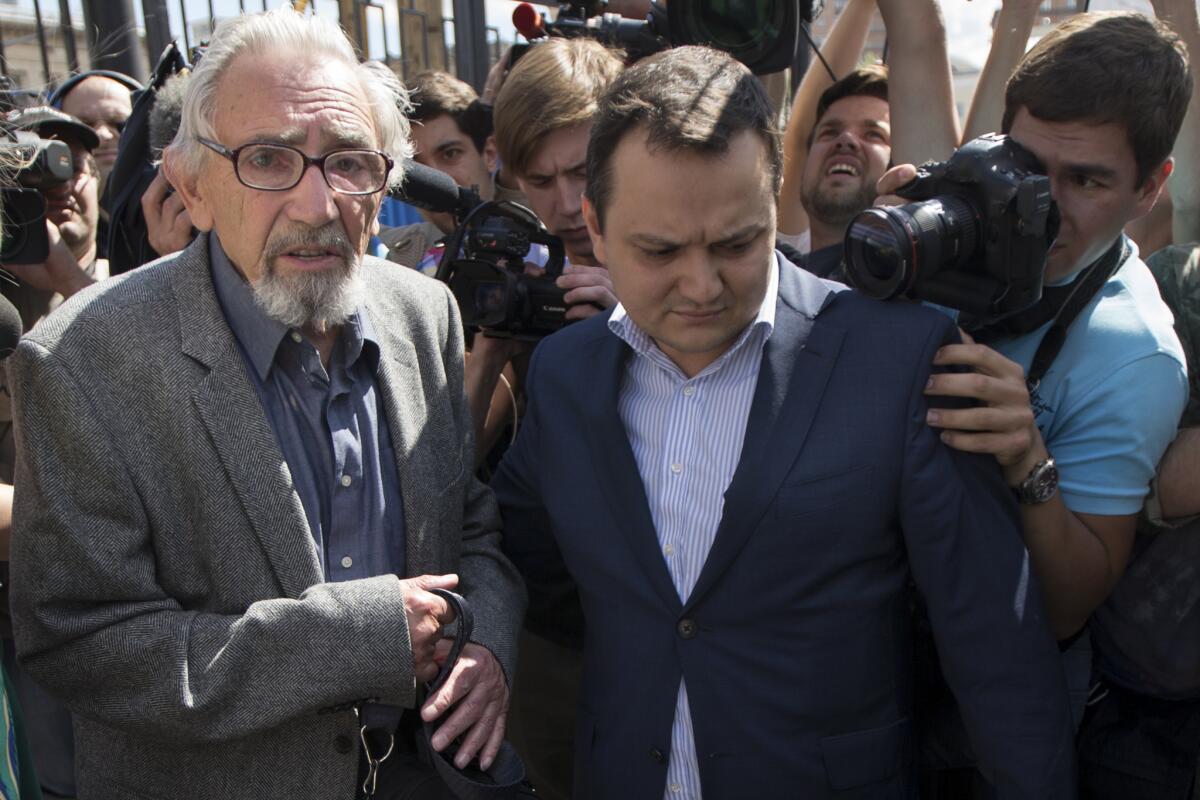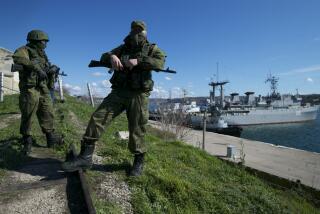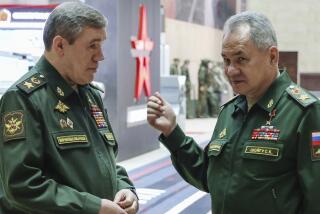Russian lawmakers move to retaliate against Europe with asset seizures

Boris Khodorkovsky, left, arrives with his lawyer Thursday for questioning in a homicide in which Russian authorities claim his exiled son and Kremlin critic, Mikhail Khodorkovsky, is a suspect.
Russian lawmakers are making good on threats to retaliate against foreign governments that seize Russian property abroad to settle claims brought by former shareholders of the Yukos oil company, which a European court has ruled was looted by the Kremlin.
The State Duma, Russia’s lower house, published the text of a proposed law that would provide for “mutuality of jurisdiction immunity,” legalese for allowing tit-for-tat property confiscation against any foreign government that impounds Russia-owned assets abroad to pay the court-ordered claims.
Yukos was among Russia’s most lucrative energy giants until the government, early in President Vladimir Putin’s administration, accused founder and Chief Executive Mikhail Khodorkovsky of tax evasion. Khodorkovsky was arrested at gunpoint in 2003 and spent 10 years in prison before being released in late 2013 as part of a general amnesty before Russia’s hosting of the 2014 Winter Olympics. Most of Yukos’ assets were nationalized and transferred to Rosneft, a competing oil company controlled by a close Putin ally, and a Moscow court declared Yukos bankrupt in 2006.
------------
FOR THE RECORD:
Russia legal claims: In the Aug. 9 Section A, an article about Russian plans to retaliate against European countries that seize Russian assets to satisfy the claims of dispossessed Yukos shareholders incorrectly attributed the $50-billion judgment to the European Court of Human Rights. The court ruled that the charges brought against Yukos Chief Executive Mikhail Khodorkovsky and other executives were politically motivated, but it was the Permanent Court of Arbitration in The Hague that awarded the compensation. —
------------
Former Yukos shareholders brought suit against the Russian government seeking compensation, and the European Court of Human Rights ruled last year that charges against Khodorkovsky and other Yukos executives were politically motivated and ordered $50 billion in compensation to the dispossessed shareholders.
Courts in Belgium and France in June authorized the seizure of state-owned Russian property in those two countries -- including Tass news agency offices and some Russian diplomats’ bank deposits -- to contribute toward the settling of the shareholders’ claims.
Putin cast the court decision as invalid in Russia and vowed to take retaliatory action against any state that confiscated Russian property to pay Yukos claims. Prime Minister Dmitri Medvedev told a Cabinet meeting last month that “our state must have a right to impose response restrictions” on the legal liability for foreign assets in Russia.
Konstantin Dobrynin, a constitutional law expert in the Federation Council upper house, last month proposed creating a new state agency charged with “managing risks of possible lawsuits filed by international creditors against Russia.” He expressed concern that the Yukos case and the foreign courts’ willingness to enforce judgments against Russia could set a precedent and inspire other disgruntled foreign investors to take similar legal action.
The bill posted on the Duma website on Thursday was drafted by the Justice Ministry and would allow selective elimination of the legal protection currently accorded to foreign governments for their property in Russia. The Kremlin leadership has made it clear that the legislation, which would take effect in January, is in retaliation for the European confiscations of Russian property.
Neither the court-approved asset seizures in Europe nor those envisioned by Russia involve embassies or other diplomatic properties, which are protected from such actions by international treaties.
It was unclear when the vote on the measure would be held, but since the bill has Putin’s backing and the Duma is dominated by loyalists of the United Russia party, its passage is all but guaranteed if the Kremlin decides to move it forward.
The Russian Investigative Committee, an FBI-like law enforcement body, in June reopened a 1998 cold case involving the slaying of a Siberian mayor and named Khodorkovsky as a suspect. Human rights activists denounced that move as another politically motivated attempt to discredit Khodorkovsky, a fierce Kremlin critic who now lives in Switzerland.
Russian agents on Thursday took Khodorkovsky’s 82-year-old father in for questioning. Boris Khodorkovsky’s lawyer, Sergei Badamshin, called the summons “shameless pressure” and an attempt to punish his exiled son.
Follow @cjwilliamslat for the latest international news 24/7
More to Read
Sign up for Essential California
The most important California stories and recommendations in your inbox every morning.
You may occasionally receive promotional content from the Los Angeles Times.











